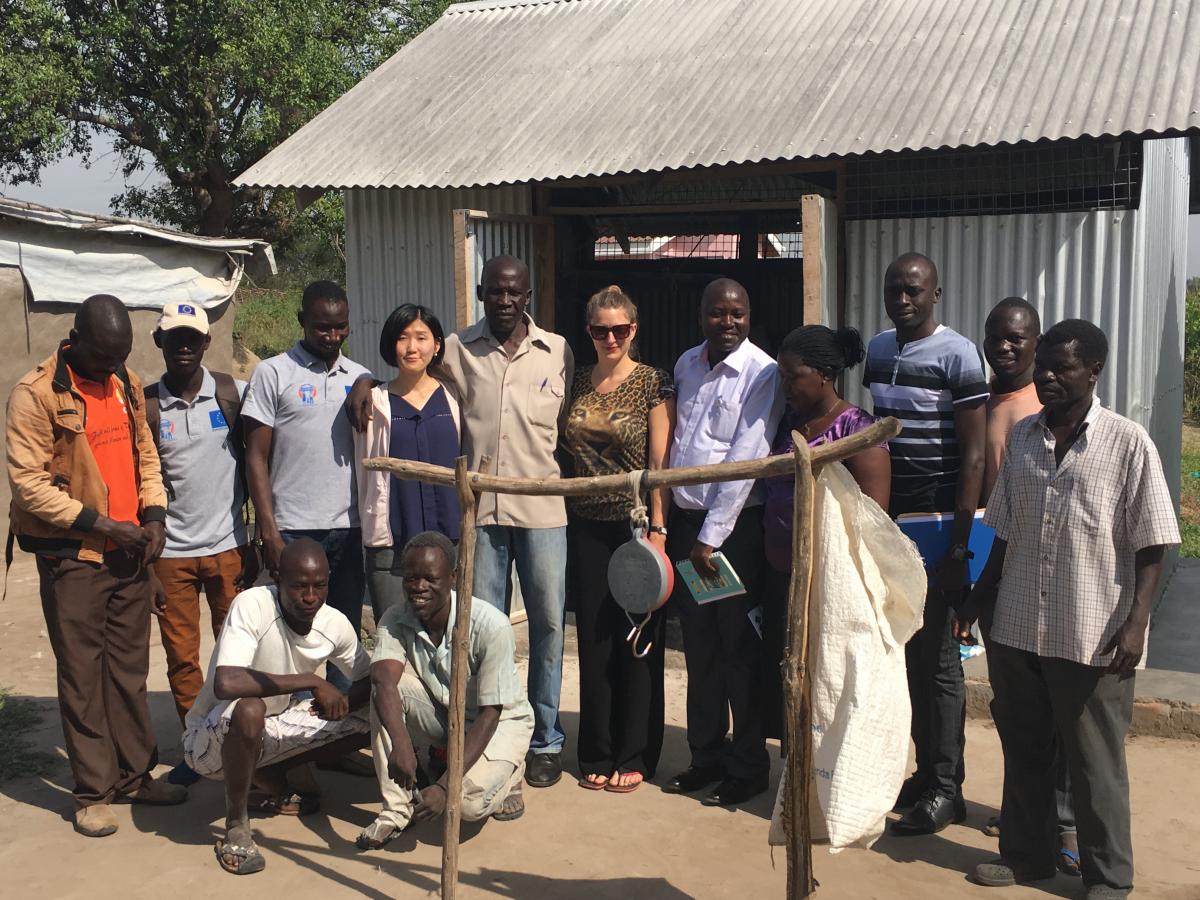SPRS-NU hosts UNHCR team advancing Comprehensive Refugee Response Framework
The European Union Trust Fund’s (EUTF) Support Programme for
Refugee Settlements in Northern Uganda (SPRS-NU) recently hosted a team from UNHCR,
which is supporting governments to roll out the Comprehensive Refugee Response
Framework (CRRF).
The CRRF calls for greater support to refugees and the
countries that host them. It specifies key elements for a comprehensive
response to any large movement of refugees, which include rapid and
well-supported reception and admissions; support for immediate and on-going
needs; assistance for local and national institutions and communities receiving
refugees; and expanded opportunities for solutions.
The team, made up of
Caroline Lensing-Hebben, the UNHCR CRRF Development Adviser in Geneva and three
other members, was visiting programmes that have a close cooperation with the
districts/governments in providing sustainable and comprehensive interventions;
a strong support to host communities and activities with strong medium and
long-term focus.
The
objective of the mission was to gather concrete examples and highlight how
development partners contribute to the response. The findings are to be
showcased by the UN High Commissioner for Refugees at the High Commission
Dialogue on 18-19 December, 2018.
The team visited the
livelihood component of the SPRS-NU, implemented by CEFORD in Eden village,
Rhino Camp refugee settlement, Arua district and two farmer field schools in
Kiryandongo supported by Save the Children. They interacted with three farmer
field schools; one in Arua called Awadifo
(which means ‘thank you’ in the local language Lugbara) and Rubanga Wie Pe Will (which means ‘God Does Not Forget’ in the local
language Acholi) and Kiryandongo Bee
Keepers’ Association.
Awadifo grows crops such as simsim, eggplant and
cassava for promoting food security and runs a grinding mill received from
CEFORD. Each month, the group earns about UGX1,700,000 (USD472) from the grinding
mill.
Lensing-Hebben appreciated the ability of SPRS-NU to impact
lives through the household incomes and food security they are improving.
The visitors
also engaged with the conflict management component run by ZOA. They interacted
with a local court in Eden village, Rhino Camp, which has members from both the
local (Ugandan) councils as well as refugee welfare councils. These have formed
a local court that mediates in conflicts and attempts to resolve cases.
“We used to
have very many conflicts between refugees as well as between refugees and
nationals but they are now reducing since we were equipped with skills and
knowledge on how to prevent and solve them,” said Samuel Albino, Chairperson of
the Refugee Welfare Council in Eden village. “For those cases that we are not
able to handle, we refer them to the higher authorities.”
Lensing-Hebben was appreciative of the collaboration between
refugee welfare councils and local councils.
Visiting the
Accelerated Education Programme (AEP) at Ofua Primary School in Arua District,
the AEP learning centre headteacher greatly appreciated the EUTF-SPRS-NU
interventions. The Accelerated Education Programme is a flexible,
age-appropriate programme that brings back to school children who had dropped
out. The school is a community one which does not get any funding from the
Government – but is mainly supported by the community and non-governmental
organisations. Save the Children has built a classroom block at the school and
supports both South Sudan refugees and Ugandan nationals.
In
Kiryandongo, the team visited the WASH component of the programme. They saw a production
well under construction by the Austrian Development Agency (ADA) and a water supply
tank for both refugees and host communities. It was revealed that with the
completion of the project there would be better access to safe water and the
number of hours that girls/women spent in queues for water would reduce by more
than four hours.
The team
wound up with a visit to the skills development and entrepreneurship component,
implemented by Enabel, the Belgian development agency, through several
grantees. The visit was to Flaminio Vocational Training Institute, in Arua, which,
in partnership with Action Africa Help International Uganda, offers training in
trades such as tailoring, catering, welding, bricklaying and construction for
refugee and Ugandan youth.
The visit also
included a stop-over to students who
underwent a six-month training at Welthungerhilfe’s Vocational Skills Centre in
Siripi, Rhino Camp, and are now on internship with various private sector
enterprises. Through internship, the students get exposure to the real place of
work, business and entrepreneurial world.
“I have
learnt a lot from this tailoring workshop; now I can make all kinds of wares I
learnt about in the training centre. I look forward to starting my own
business,” said Jacob Akoy, an intern.
“I saw a lot
of positive impact,” said Lensing-Hebben. “I saw development
and humanitarian partners coming together to create change for communities, working
in partnership with the local government.”
At a
‘meet-and-greet’ dinner for the team, the Deputy Chief Administrative Officer
Arua district, Paul Samuel Mbiwa, said the district appreciates the support of
the development partners for they are creating impact.
“When we go
on monitoring missions we can see that the refugees’ lives are changing through
the SPRS-NU programme,” he said. He pledged the district’s support to ensuring
that programmes succeed.
Latest news from this project
No news

